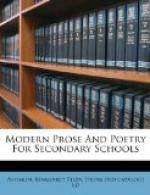Therefore I love the people very much, more and more, the more I know them....
And with this, I say good-night.
Ever most truly,
LAFCADIO HEARN.
CHARLES ELIOT NORTON TO WILLIAM DEAN HOWELLS
SHADY HILL, 2 May, 1902.
“The Kentons” have been a great comfort to me. I have been in my chamber, with a slight attack of illness, for two or three weeks, and I received them one morning. I could not have had kinder or more entertaining visitors, and I was sorry when, after two or three days, I had to say Good-bye to them. They are very “natural” people, “just Western.” I am grateful to you for making me acquainted with them.
“Just Western” is the acme of praise. I think I once told you what pleasure it gave me as a compliment. Several years ago at the end of one of our Christmas Eve receptions, a young fellow from the West, taking my hand and bidding me Good-night, said with great cordiality, “Mr. Norton, I’ve had a delightful time; it’s been just Western”!
“The Kentons” is really, my dear Howells, an admirable study of life, and as it was read to me my chief pleasure in listening was in your sympathetic, creative imagination, your insight, your humour, and all your other gifts, which make your stories, I believe, the most faithful representations of actual life that were ever written. Other stories seem unreal after them, and so when we had finished “The Kentons,” nothing would do for entertainment but another of your books: so now we are almost at the end of “Silas Lapham,” which I find as good as I found it fifteen or sixteen years ago. As Gray’s idea of pleasure was to lie on a sofa and have an endless succession of stories by Crebillon,—mine is to have no end of Howells!...
NOTES
Letter from William Vaughn Moody:—
=darkened counsel=:—See Job, 38:2. Moody seems to be referring here to the uncertainty of his plans for the future.
Letter from Bret Harte:—
=Franky=:—Francis King Harte, Bret Harte’s second son, who was eight years old at this time.
=Concepcion de Arguello=:—One of Bret Harte’s longer poems.
=Kentuck=:—A rough but kindly character in Harte’s The Luck of Roaring Camp.
=Dick Bullen=:—The chief character in How Santa Claus Came to Simpson’s Bar.
=Frank=:—Bret Harte’s name was Francis Brett Hart(e), and his family usually called him Frank.
Letter from Lafcadio Hearn:.—
=Chamberlain=:—Professor Chamberlain had lived for some years in Japan, when Hearn, in 1890, wrote to him, asking assistance in securing a position as teacher in the Japanese Government Schools. The friendship between the two men continued until Hearn’s death.




